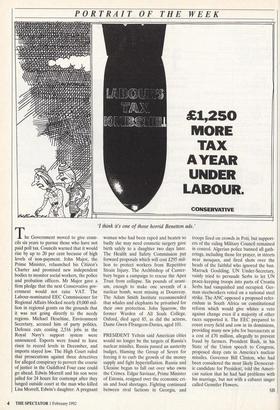PORTRAIT OF THE WEEK
'I think it's one of those horrid Benetton ads.' The Government moved to give coun- cils six years to pursue those who have not paid poll tax. Councils warned that it would rise by up to 20 per cent because of high levels of non-payment. John Major, the Prime Minister, relaunched his Citizen's Charter and promised new independent bodies to monitor social workers, the police and probation officers. Mr Major gave a firm pledge that the next Conservative gov- ernment would not raise VAT. The Labour-nominated EEC Commissioner for Regional Affairs blocked nearly £9,000 mil- lion in regional grants on the grounds that it was not going directly to the needy regions. Michael Heseltine, Environment Secretary, accused him of party politics. Defence cuts costing 2,516 jobs in the Royal Navy's support system were announced. Exports were found to have risen to record levels in December, and imports stayed low. The High Court ruled that prosecutions against three detectives for alleged conspiracy to pervert the course of justice in the Guildford Four case could go ahead. Edwin Morrell and his son were jailed for 24 hours for contempt after they lunged outside court at the man who killed Lisa Morrell, Edwin's daughter. A pregnant woman who had been raped and beaten so badly she may need cosmetic surgery gave birth safely to a daughter two days later. The Health and Safety Commission put forward proposals which will cost £295 mil- lion to protect workers from Repetitive Strain Injury. The Archbishop of Canter- bury began a campaign to rescue the Apex Trust from collapse. Six pounds of urani- um, enough to make one seventh of a nuclear bomb, went missing at Dounreay. The Adam Smith Institute recommended that whales and elephants be privatised for their own protection. John Sparrow, the former Warden of All Souls College, Oxford, died aged 85, as did the actress, Dame Gwen Ffrangcon-Davies, aged 101.
PRESIDENT Yeltsin said American cities would no longer be the targets of Russia's nuclear missiles. Russia passed an austerity budget, blaming the Group of Seven for forcing it to curb the growth of the money supply and fight hyperinflation. Russia and Ukraine began to fall out over who owns the Crimea. Edgar Savisaar, Prime Minister of Estonia, resigned over the economic cri- sis and food shortages. Fighting continued between rival factions in Georgia, and troops fired on crowds in Poti, but support- ers of the ruling Military Council remained in control. Algerian police banned all gath- erings, including those for prayer, in streets near mosques, and fired shots over the heads of the faithful who ignored the ban. Marrack Goulding, UN Under-Secretary, vainly tried to persuade Serbs to let UN peace-keeping troops into parts of Croatia Serbs had vanquished and occupied. Ger- man steelworkers voted on a national steel strike. The ANC opposed a proposed refer- endum in South Africa on constitutional reform which would give whites a veto against change even if a majority of other races supported it. The EEC prepared to count every field and cow in its dominions, providing many new jobs for bureaucrats at a cost of £70 million, allegedly to prevent fraud by farmers. President Bush, in his State of the Union speech to Congress, proposed deep cuts in America's nuclear missiles. Governor Bill Clinton, who had been considered the most likely Democrat- ic candidate for President, told the Ameri- can nation that he had had problems with his marriage, but not with a cabaret singer called Gennifer Flowers.
SB


















































 Previous page
Previous page